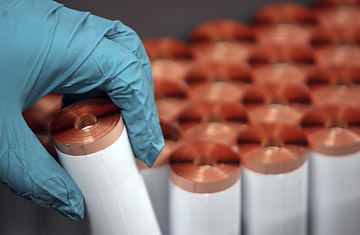
As we wean cars and trucks off gasoline and other fossil fuels, battery technology will become increasingly important. Until recently, most larger-scale batteries were made using nickel and cadmium, but they were heavy, and lacked the long life needed to properly power cars. That's shifted in recent years to lithium-ion batteries, which can be made much smaller, with a superior weight-to-energy ratio. Your laptop, iPod and cell phone all use rechargeable lithium-ion batteries. The hope is that the same kind of technology will finally begin to make electric cars a reality, by producing batteries that can run a car for 40 miles or more per charge, but which won't take up the entire backseat. Tesla Motor's all-electric Roadster runs on nearly 7,000 lithium-ion cells, while General Motors's innovative plug-in car, the Volt, will be using 400-lb. lithium-ion batteries from the Korean company LG Chem. Right now lithium-ion batteries still aren't cheap enough to make electric cars truly economically viable, but the hope is that as projects like the Volt reach scale, the price will drop dramatically.